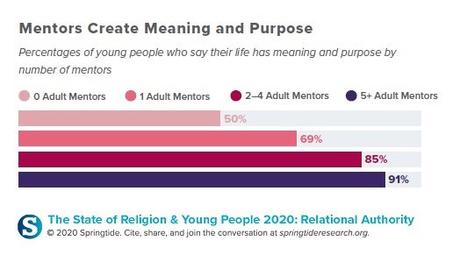I’ve been collaboring with Springtide Research Institute for some time, in various capacities, and I’ve been so impressed with their surveys and analyses about themes of loneliness, religion, and the importance of mentoring in young people. The following guest post is from Springtide’s media relations’ specialist, and is very timely. Hope you enjoy!
~Andy
***
It’s an experience so common it might be considered a holiday cliché if it weren’t true: that inevitable, excruciating barrage of questions, often directed at young people about their accomplishments, goals, or plans.
I’ve experienced it firsthand, when I announced to my now-wife’s family we were getting engaged and was immediately grilled by an uncle about my employment status and earning potential. But others have it worse. I cringe recalling a family member’s boyfriend being interrogated, then advised, then compared to others about his life choices, prospects, and setbacks. He’d had a particularly difficult year, and the onslaught of questions from an intoxicated aunt bordered on cruel. He did his best to remain calm and composed, but he had arrived ready to relax, eat, and chat light-heartedly.
In fact, that’s what most young people are hoping for – and this holiday season, when many have undergone incredible stresses, it’s more important than ever to be sensitive about heavy or hard conversations.
Well over half of young people – about six in ten – do not want to talk about difficult things during the 2020 holidays because they want it to be a time of joy and lightheartedness. Who can blame them? Studies have found that Gen Zers have been the biggest losers during the pandemic in terms of the job market, the economy, mental stress, and depression. Even more, as reported in Springtide Research Institute’s November, 2020, survey of 2,000 young people aged 13-25, 44% wouldn’t feel safe, welcome, or encouraged to have vulnerable conversations about difficult topics over the holidays this year.
Unlike older adults, young people – and particularly those under the age of 18 – do not always have the freedom to opt out of in-person holiday gatherings. I still remember the subtle threats my father used to ensure I was present at family holiday parties, despite my complaints from time to time. Now that 2 in 5 Americans have confirmed they will attend holiday gatherings this year with 10 people or more, it appears there will be plenty of opportunities for older adults to do right by young people, who would rather avoid trying to debrief or grieve the difficult year they’ve had.
With that in mind, here are a few tips for adults hoping to be hospitable to young people at holiday gatherings this year.
1. Don’t assume young people are interested in rehashing the difficulties of the year.
It’s no secret that the pandemic has presented hurdles for young people to stay connected with friends and mentors, get through school with passing grades, find jobs, and maintain healthy habits. Bad news is everywhere; does it have to be rehashed at your holiday party?
It’s natural to assume that in the context of a trusting relationship, vulnerable conversations about difficult topics are pretty typical – if not expected. 2020, however, was anything but a typical year for young people, who shoulder significant anxiety and uncertainty about the future. With over six in ten unwilling to engage in difficult conversations this holiday season, it’s best to suspend your expectations for an unabated, what’s-really-going-on conversation with them.
2. Avoid questions that probably don’t have answers right now.
For most young people, the pandemic has raised more questions than answers. One my cousins, for example, is a highly motivated student who was accepted into competitive engineering program at a top-tier college this Fall. I remember when the announcement was made to the family, met with warm congratulations. However, struggling to acclimate to virtual learning, he felt he had no choice but to put the degree on pause. My aunt told me he is looking for a job but is mostly uncertain about what he’ll do in the interim – and whether he’ll go back to school at all.
Imagine, for a second, that my cousin is asked in front of the family this Christmas for a status update on his college journey. I’ve been in this exact situation many times, and I wish it ended there. Most of the time, this evolves into a smothering of probing questions about when I will finish my degree and what my strategy will be on the job market. Fortunately, I usually have answers to those questions – but this year, those answers are not as readily available for young people like my cousin, whose plans were disrupted by the pandemic.
This year, assume young people have more questions than answers. Instead of offering your two cents – or maybe ten cents – about what they might be going through, invite them to have a conversation with you at a later date if you feel you have something to offer them. This approach gives young people the freedom to decide when, and if, they might approach you.

3. Don’t be a stranger.
Some adults take the opposite approach with young people – instead of interrogating, they are dismissive. I was banished to the “kid table” more than a few times at holiday gatherings, even after I turned 18. As a case in point, Springtide found that half of young people wish the adults in their lives would let them into political conversations more often (47%), but feel their political opinions are disregarded (41%).
Despite the difficult year they had, we shouldn’t conclude that young people are dreading holiday gatherings. In fact, over half in Springtide’s survey (55%) selected “seeing loved ones” as the most meaningful ritual over the holiday season, more than any other option they could select. If you are more of the dismissive type – murmuring “kids these days” – consider how you might be more available and present to young people this year.
Many adults underestimate the impact they can have a young person’s life. Springtide discovered that 27% of young people have one or fewer adults in their life they can turn to if they need to talk. Though their smartphones are constantly buzzing, young people today are experiencing record levels of loneliness. Nearly 40% say they feel they have no one to talk to and that no one really knows them well, at least sometimes. Many in the US and around the world experience increased connectivity but decreased connection.

A powerful antidote to feelings of loneliness for young people is relationships with older adults they can trust. As shown in the data presented above, with each trusted adult, young people experience less loneliness and feel more strongly that their life has meaning and purpose.
Between interrogation and dismissal is a third option for how we can engage young people: being present and available. I’ve tried to model this in my exchanges with my students at the community colleges where I teach. I remind them often: “I love hearing from you!” They’ve confided in me more than ever this year, reaching out about issues like job loss, mental health crises, contracting COVID-19, and losing family members to the virus. With each invitation to peek into their lives, I have an opportunity to be attentive and reassuring rather than dismissive or overbearing. For some, this made the difference between sticking with the class and dropping out.
This year, adults have the same opportunity: we can make things heavier for young people or honor their hopes for a holiday season that’s merry and bright. A pro tip is to show up wearing your ugliest Christmas sweater, and come what may.
This post was guest authored by Kevin Singer (@kevinsinger0), Media Relations Specialist for Springtide Research Institute, an adjunct faculty member at two community colleges, and a doctoral student in higher education at North Carolina State University.
This post was first published at www.psychologytoday.com.
